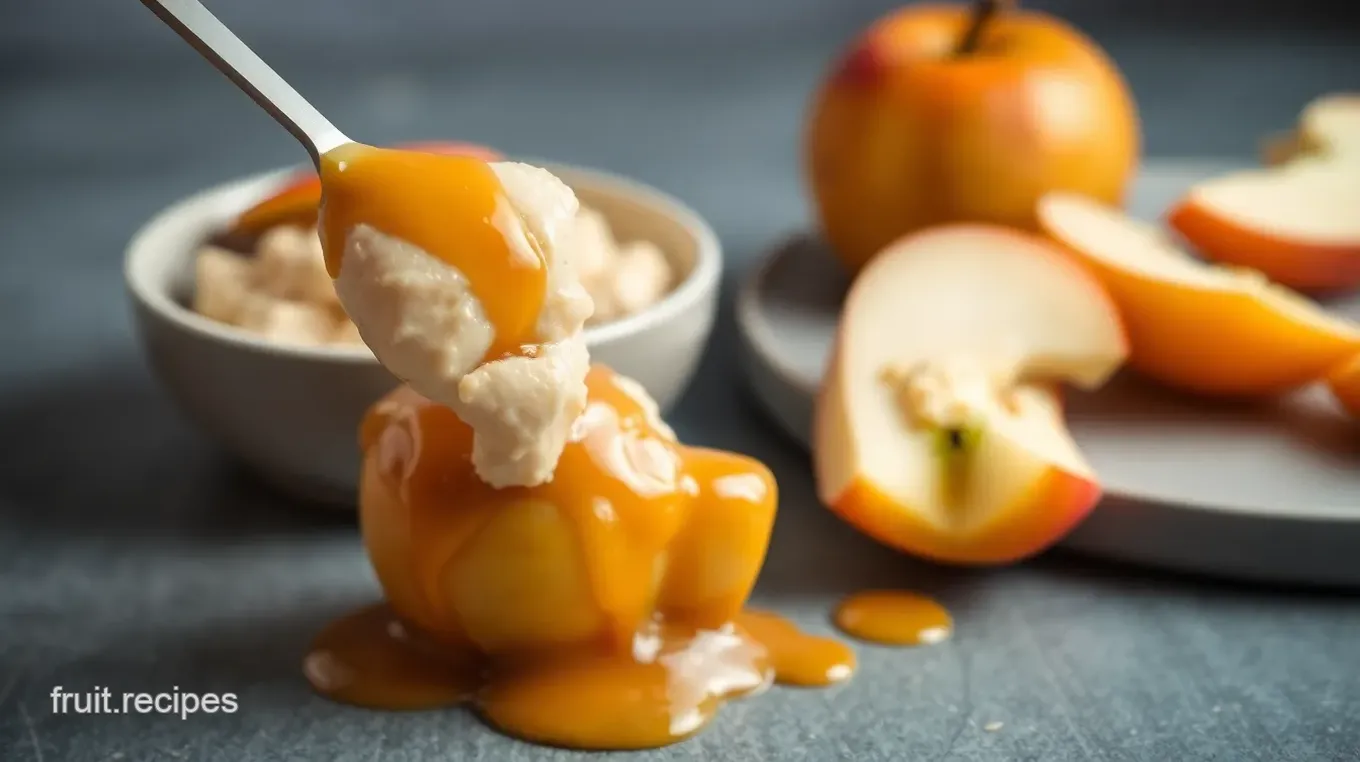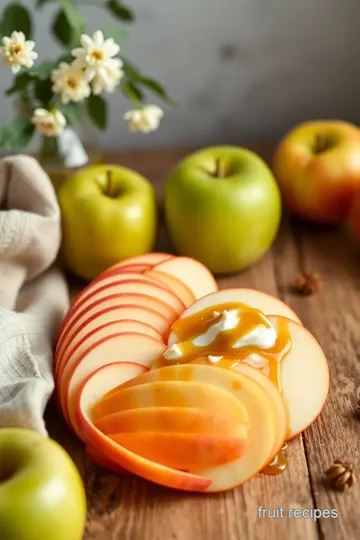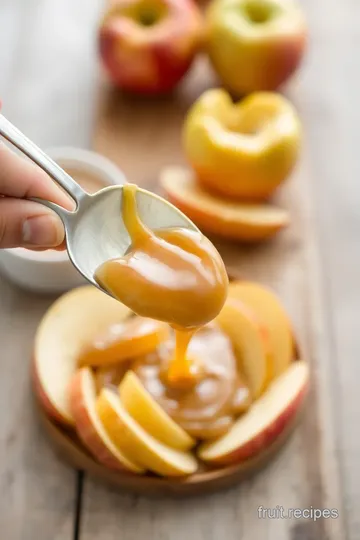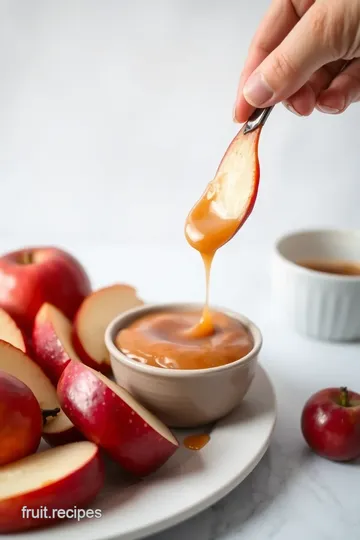Dip Apples in Creamy Caramel Delight
Wondering how to dip apples in creamy caramel delight? This homemade caramel sauce is easy and utterly delicious. Perfect for gatherings or cozy nights!

A Sweet Start to Fall: Dip Apples in Creamy Caramel Delight
Oh my gosh, i still remember the first time i made caramel apples. i was just a kid, maybe 10 years old, and my mom decided it was time for a fun kitchen adventure.
We melted sugar and butter, caramel glistening like gold in the pot. honestly, i think i became hooked on that sweet, buttery goodness right then! fast forward to today, and now i want to share with you a twist on that classic.
Let’s talk about how to dip apples in creamy caramel delight .
Unearthing the Roots of a Classic Treat
When it comes to caramel apple recipes , this one has history! caramel itself has been around since the 18th century, but it wasn't until the 1950s that it really became popular with apples.
Dipping fresh, crisp apples into a warm caramel sauce quickly turned into a staple at fairs and fall festivities. nowadays, this delightful combo is a go-to for everything from birthday parties to cozy autumn nights at home.
And guess what? this recipe is not just easy to whip up; it thrives on simple ingredients you probably have in your pantry.
With just over 15 minutes of active prep time and a total clock-in time of about 55 minutes, this easy caramel dip is a total win.
You’ll have a treat that yields around four servings of pure joy! plus, you can keep costs low; with ingredients like brown sugar and apples, you’re looking at a budget-friendly dessert experience.
Why You’ll Love This Recipe
Alright, let’s get into the key benefits . first off, the health perks! apples are packed with nutrients like fiber and vitamin c.
So, you can feel a little less guilty about that caramel indulgence. we all need sweet treats, right? and here’s a kicker: if you play around with toppings—think nuts, chocolate chips, or even drizzling some vegan caramel alternatives—you can create a gourmet caramel variation that fits any sweet tooth.
This recipe also shines during special occasions. it’s the kind of eye-catching dessert that grabs attention on your table. imagine it served as a part of your festive party food , or even at a cozy movie night.
Your friends will be raving about these sweet apple treats for ages!
And let’s not forget about the unique selling points! homemade caramel sauce is always better than store-bought. it gives your apples that rich, buttery flavor and a classic feel.
Trust me, your friends and family will savor every bite when they indulge in these sliced apples with caramel .
Making It Your Own
One of the best things about dipping apples is the endless apple dipping ideas you can explore. want to spice things up? add some cinnamon to your caramel sauce for a cozy fall twist.
Or, perhaps a splash of bourbon for an adult version if you’re feeling adventurous! the possibilities are as vast as your imagination.
Also, if you want something a little different than the traditional apple, go ahead and dip pears. Trust me, they work fabulously with a creamy caramel dip too!
So, are you ready to dive into this delicious haul? there’s a little prep work, mixing some sweet ingredients and making that amazing homemade caramel sauce .
Trust me; your family will love you for it! let’s get on to what you need, shall we?
Ingredients to Get You Started
Let’s gather up those ingredients—you’ll need some medium apples like granny smith or honeycrisp, and for that rich caramel sauce, get your brown sugar, heavy cream, butter, vanilla extract, and a pinch of salt ready.
Just the sight of these will get your taste buds tingling!
Now go ahead and grab those ingredients! We’re about to create some magic in the kitchen that’ll give you that warm, fuzzy feeling all season long.

Essential Ingredients Guide for Your Perfect Caramel Dipping Experience
Alright, friends! let's dive into the essentials you’ve gotta have to dip apples in creamy caramel delight . this isn’t just any ol' caramel; we're talking homemade caramel sauce that’ll make you the star of any get-together, whether it's a cozy night in or a festive party.
So grab your apron, and let’s get started!
Premium Core Components
First off, measurements matter . for our dreamy caramel, you’ll need 1 cup (200g) of packed brown sugar , 1/2 cup (120ml) of heavy cream , and 1/4 cup (56g) of unsalted butter .
Got it? you can also easily convert these to metric if that’s your jam, but that’s getting ahead of ourselves!
Quality Indicators for Each Ingredient
Quality, folks! look for fresh, plump apples like granny smith or honeycrisp for that perfect crunch. when you pick them up, give them a gentle squeeze—if they feel firm and look bright, you're golden! and when it comes to butter, go for unsalted to keep the flavor balanced.
Storage Guidelines and Shelf Life
You can store your caramel sauce in an airtight container in the fridge for up to two weeks . just reheat it gently before serving, and it’ll be ready to go! apples? they’re best enjoyed fresh, but a slice of lemon juice can help slow down browning if you’re planning on slicing them for a crazy fruit platter .
Freshness Tips and Selection Criteria
How do you make sure you're getting the freshest apples? when shopping, look at the skin . the shinier, the better! no blemishes or soft spots, please! and when choosing brown sugar, you want it soft, not like a rock.
If it’s a tad hard, just pop it in the microwave for a few seconds with a damp paper towel, and voila!
Signature Seasoning Blend
Now, you might not think about seasoning when it comes to caramel, but trust me! a pinch of salt at the end kicks it up a notch! for a signature twist, try adding a sprinkle of cinnamon or even a splash of bourbon for those adult parties.
Essential Spice Combinations and Herbal Selections
Mixing spices is like alchemy. besides that pinch of salt, we like to bring in a dash of vanilla extract to highlight those sweet, buttery notes in our caramel sauce.
You could even use other extracts—like almond or maple—for a unique take on this classic!
Smart Substitutions
Okay, what if you’re outta heavy cream? no problem! you can easily swap that out for coconut milk for a guilt-free caramel option.
And hey, if you want to keep it vegan, try making homemade caramel with maple syrup or agave. you won’t even miss the regular stuff!
Kitchen Equipment Essentials
Must-have tools, ya say? you’ll definitely need a medium saucepan and a good stirring spoon. if you’ve got a candy thermometer —awesome! but if not, don’t sweat it.
Just keep an eye on it for that soft-ball stage at about 235° f ( 113° c) .
Preparation Tips
Before you start, make sure all your ingredients are prepped and ready to go. no one wants to scramble for sugar when the caramel’s bubbling away! and once it’s done, let it cool a bit to thicken before you dip your apples.
Storage Solutions
As i mentioned, store that delicious homemade caramel sauce in an airtight container in the fridge. you can even freeze it if you want to indulge later.
Just let it thaw overnight in the fridge before using it again. that way, you can keep making those delightful apple snacks for kids any time!
There you have it, your full guide to crafting that perfect Dip Apples in Creamy Caramel Delight ! Now, are you ready to start playing with ingredients and put that knowledge into action? Grab those apples, and let’s whip up some decadent happiness together! You won’t regret it when your friends are raving about your caramel apple recipe ! Ready, set, caramelize!
Cook Like a Pro: The Art of Dipping Apples in Creamy Caramel Delight
Ah, fall. the air gets crisp, the leaves turn vibrant, and it’s the perfect time to indulge in some sweet apple treats.
Dip apples in creamy caramel delight is one of those cozy recipes that’ll have you feeling all warm and fuzzy inside.
Plus, what better way to bring flavor to your autumn gatherings? grab your apples and let’s get into the nitty-gritty of how to whip up this delicious caramel treat!
Essential Preparation Steps
Before diving into the actual cooking, let’s talk about how to get your kitchen ready. mise en place , my friends, is key.
This french culinary term simply means “everything in its place.” gather your ingredients—1 cup brown sugar, 1/2 cup heavy cream, and 1/4 cup unsalted butter, among others.
Having everything ready to roll makes the cooking process so much smoother.
Next up— time management ! aim for a nice flow. you’ll spend about 15 minutes prepping and 10 minutes cooking —not bad for some creamy caramel, right? while the caramel cools for 20- 30 minutes , you can slice your fresh apples.
Apples like granny smith or honeycrisp are great choices because their tartness works perfectly with the sweet caramel—trust me, your taste buds will thank you!
Organization is super helpful. keep your workspace tidy. and let’s not forget about safety ; when you’re cooking sugar, it can get crazy hot.
So, stay alert and avoid any distractions. use a candy thermometer and aim for a nice, safe 235° f/ 113° c until you reach that soft-ball stage.
Step-by-Step Process
Alright, let’s break it down into easy pieces. Here’s how to make your creamy caramel dip:
-
Combine Ingredients : In a medium saucepan, toss in brown sugar , butter , and heavy cream . Stir.
-
Heating Things Up : Place your pan over medium heat and continuously stir until the mixture starts to bubble.
-
Boil It Down : Once it’s bubbling, let it boil without stirring for 2- 3 minutes . You want to keep a close eye to ensure it thickens just right.
-
Flavor It Up : Off the heat, stir in vanilla extract and a pinch of salt. This step enhances that buttery richness!
-
Chill Time : Let the caramel cool for 20- 30 minutes until it’s perfect for dipping—not too runny and not dried out.
-
Dipping delight : arrange your sliced apples next to the bowl of caramel. for a fun twist, you can sprinkle some chopped nuts or mini chocolate chips on those slices for an added flair.
Expert Techniques
Now, some expert tips to hone your skills. if you want your caramel to have that dreamy texture, controlling the temperature is crucial .
Invest in a good candy thermometer to help you nail that perfect consistency. aim for the soft-ball stage for a luscious dip.
Keep an eye on timing precision too; overstirring can lead to grainy caramel, which we definitely want to avoid. if that happens, don’t panic! you can always add a touch of water and reheat gently until it's smooth again.
Success Strategies
Let’s talk about common pitfalls. a major one is burning the caramel. it can go from perfect to ruined in a flash! so, stay vigilant during the boiling process.
If you accidentally overcook it, you might end up with a hard candy rather than a velvety sauce.
For quality assurance , taste your sauce before serving. a little tweak of salt or even a pinch of cinnamon can elevate your caramel to gourmet levels! if you're in a pinch, you can make a homemade caramel sauce ahead of time and store it in the fridge for later use—talk about a quick dessert recipe for busy days.
Incorporate creative apple recipes too. Swap apples for pear slices, or serve with cheese for a sweet-savory combo. The options are endless!
Wrapping It Up
So there you have it! dip apples in creamy caramel delight is not just a recipe; it’s a seasonal experience.
Perfect for fall parties or cozy nights in, this creamy caramel dip paired with fresh apples brings delightful nostalgia and warmth to your gatherings.
Remember, the secret is in the preparation and a touch of patience.
I hope you give this a whirl—and when you do, get a little creative! you’ll find it’s not just about the taste but the fun you have along the way.
Now, for more inspiration to elevate your apple snacking game, let's dive into some additional information that’ll keep that sweet vibe rolling!

Additional Recipe Information for Dip Apples in Creamy Caramel Delight
Pro Tips & Secrets
Oh my gosh, if you want to dip apples in creamy caramel delight , i've got a few tricks up my sleeve.
First off, use a candy thermometer ! seriously, if you're aiming for that perfect, gooey consistency, you want to hit the soft-ball stage at around 235° f ( 113° c) .
Trust me, i learned this the hard way when my caramel turned out more like syrup—yikes!
Another time-saver? prep your apples in advance. wash, dry, and slice those beauties before you heat up the caramel. this way, you'll dodge the awkward moment of a melting sauce waiting for apples—awkward! and honest to goodness, adding a pinch of cinnamon to the caramel gives it that cozy fall vibe.
You’ll definitely want a little spice in your life, and it plays so well with the tartness of those apples.
Perfect Presentation
Let’s talk about making your magic look good because let’s be real, we eat with our eyes first, right? arrange those apple slices on a platter in a circular pattern—yes, like a fancy fruit pizza! pour the homemade caramel right in the middle, or better yet, serve it in individual bowls for that “dress-to-impress” touch.
Garnish is your best friend! a sprinkle of chopped nuts or a dash of mini chocolate chips adds that wow factor.
And don't forget color—try pairing green apples with a rich, golden caramel. it's like a work of art and so appetizing, it's almost instagrammable!
Storage & Make-Ahead
If you’re like me and you sometimes make more than you can eat (whoops!), you’ll want to store your caramel right.
Let it cool, then transfer it to an airtight container. in the fridge, it’ll last about a week. just reheat it in a microwave for about 30 seconds before serving.
Give it a stir and boom! back to that smooth, creamy goodness ready for dipping.
But honestly, it's best enjoyed fresh. It won't last long once your friends and family find out how delicious it is. Easy caramel dipping leads to freshness satisfaction like nothing else!
Creative Variations
Feeling adventurous? let’s mix it up! you can swap out apples for bananas or pears—fabulous for a rich fruit treat.
When you think about those candy thermometer tips , remember that even a splash of bourbon in your caramel takes it from ordinary to extraordinary—perfect for adult gatherings!
Want to keep it simple? Try coconut milk instead of heavy cream for a vegan caramel alternative. This is a game-changer for family-friendly recipes that need to cater to all diets!
Complete Nutrition Guide
Now, i know you’re wondering, "are these sweet treats good for me?" here’s the lowdown: each serving boasts about 250 calories loaded with some healthy fats from the butter (gotta love that richness!).
But hey, a little indulgence never hurt anyone, right? just like that classic american dessert, there’s room for guilt-free choices too.
If you're counting macros or watching those sugars, consider pairing with fresh fruit or even a dollop of yogurt for a protein boost.
You could say it's a fruity dessert that feeds the soul while being mindful of your health. balance is key, folks!
Expert FAQ Solutions
So many questions pop up when you’ve got caramel on your mind! one common issue? if your caramel seizes, don’t panic! just reheat it gently and stir in a splash of cream.
It’s like magic—it’ll loosen right up. and hey, if you’re wondering how to jazz it up, adding a splash of vanilla extract gives you that aromatic goodness that's just to die for.
When it comes to dipping sauce for snacks , this caramel can do it all. Seriously, pour it over popcorn for a fun twist that your kids will adore! It’s all about getting creative with those apple snacks for kids —they're going to love it!
Encouraging Conclusion
So, there you have it! a delightful deep dive into how to dip apples in creamy caramel delight . whether it’s for a fall gathering or a cozy night in, you're armed with tips, tricks, and variations to make your caramel experience all the more magical.
Don’t be afraid to experiment—i mean, who doesn’t love a little kitchen adventure? happy dipping, friends, and remember to savor every scrumptious bite!

Dip Apples in Creamy Caramel Delight Card

⚖️ Ingredients:
- 1 cup (200g) packed brown sugar
- 1/2 cup (120ml) heavy cream
- 1/4 cup (56g) unsalted butter
- 1 teaspoon vanilla extract
- Pinch of salt
- 4 medium apples (such as Granny Smith or Honeycrisp)
- Optional: Chopped nuts (for garnish), mini chocolate chips, or sprinkles for decoration
🥄 Instructions:
- Step 1: Gather all ingredients and equipment. Wash and dry the apples, and cut them into wedges if desired.
- Step 2: In a medium saucepan, combine brown sugar, butter, and heavy cream.
- Step 3: Cook over medium heat, stirring constantly until the mixture comes to a boil.
- Step 4: Allow to boil for 2-3 minutes without stirring until the mixture thickens slightly.
- Step 5: Remove from heat, then stir in vanilla extract and a pinch of salt.
- Step 6: Allow the caramel to cool for 20-30 minutes until slightly thickened but still pourable.
- Step 7: Pour the caramel into a serving bowl or shallow dish.
- Step 8: Serve the apples alongside the caramel sauce for dipping. Garnish as desired.
Previous Recipe: Easy Simmered Cranberry Delight with Orange Zest: A Cozy Holiday Favorite
Next Recipe: How to Make Cooked Apples Cozy Spiced Delight: The Ultimate Fall Treat
